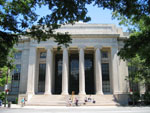Each day I receive (on-line) the Chronicle of Higher Education. I skim what I see looking for interesting information that might be useful in my frequent presentations of university audiences. As a business ethics speaker, as you can imagine I am often asked to speak to business majors on the ethical side of business choices, but a larger ethical question looms that affect all students. So here’s the story…
Jeff Young wrote – Cheaters Never Win, at Least in Physics, a Professor Finds
A professor at the Massachusetts Institute of Technology devised a clever way to detect student cheating on homework in his introductory physics course—and found about 50 percent more cheating than students reported in anonymous surveys. And he discovered that frequent cheaters ended up bombing their exams.
The professor, David E. Pritchard, led a research team that analyzed student performance in an online homework system called MasteringPhysics.com during four different semesters. The researchers were able to measure the time spent on each question and look for suspicious work patterns. If a student took less than a minute each answering several complex questions and got them all right, for instance, the system flagged that as likely cheating. “Since one minute is insufficient time to read the problem and enter the several answers typically required, we infer that the quick-solver group is copying the answer from somewhere,” said the researchers in a paper due out today in the free online journal Physical Review Special Topics–Physics Education Research.
The interesting part of this story for most is how the study correlated the consequence between cheating students and their test grades. Interesting stuff, but perhaps no great surprise. If you don’t study and don’t do your homework, how could you assume that anyone would do great on tests?
From my perspective the study, while interesting, revealed attitudes that showed ethical deficiencies. When there is an ethics lapse, review will generally reveal three components – NEED, OPPORTUNITY and RATIONALIZATION. So lets look at other parts of Mr. Young’s article and see what we can find.
Researchers found that the culprits typically copied answers from friends, by logging onto a friend’s account on the system to copy work or by getting answers via e-mail or instant message.
OPPORTUNITY – how the students cheated showed that it was not sophisticated. Rather, the likelihood that a student will cheat is related to the ease in which one might do so. In other words (less academically put)…if OPPORTUNITY is present, students (under pressure) will choose to cheat.
More students cheated later in the semester than in the beginning, and many students surveyed said that time pressures led them to copy a friend’s work.
Interesting … PRESSURE combined with opportunity was cited as a prime reason that students resorted to cheating. In fact the patter is similar to those who commit white collar crime. The fraudster is not an inherently bad person, rather, they succumb to pressure by taking OPPORTUNITY to relieve the pressure. In fact, the PRESSURE might be considered the NEED portion of the equation. One might assume that if there was a reduced homework requirement (less pressure) then there would be a greater likelihood that cheating would be reduced. Just a theory…
Either one cares less if they cheat, lie or steal OR through personal RATIONALIZATION they convert their unethical behavior into something that intellectually and/or emotionally they can deal with. Here’s what the article says…
“If you look at the self-reported data, over half the kids think receiving unfair help is either not a big deal or trivial,” Mr. Pritchard said in an interview. Among other reasons students gave for cheating: “I knew this pretty well from my high-school physics course so it was only review,” and “not motivated to learn physics because I don’t enjoy it and it’s not needed for my major.”
Mr. Pritchard said that many professors turn a blind eye when students cheat on homework. “A lot of people are willing to forgive copying because they think those students are weaker— that they work as hard but just aren’t as able to get them,” he said. But he said their research showed that cheaters were most often those who waited until the last minute to start the work and that they copy answers before even trying the problems.
IT’S A THREE LEGGED STOOL:
If you wish to reduce fraud, remove one of the legs – then it can’t stand. The same is true when it comes to cheating in school. Whether it was part of his model, in effect the professor involved removed one of the legs – HE CHANGED THE TEACHING MODEL.
The professor said he did find a way to greatly reduce cheating on homework in his class. He switched to a “studio” model of teaching, in which students sit in small groups working through tutorials on computers while professors and teaching assistants roam the room answering questions, rather than a traditional lecture. With lectures, he detected cheating on about 11 percent of homework problems, but now he detects copying on only about 3 percent of them.
Great article Mr. Young. And for those Universities who grapple with the issues of ethics and cheating…I can see this research now becoming part of my presentation. Somehow I think the students will get this…
YOUR COMMENTS WELCOME!



To whom it may concern,
i am a university student and i experience this unethical conduct at my college, i see it happening and i can’t say anything, My question is should i say something or should i leave it alone? thank you very much, please reply…
Contact me at chuck@gallagher.pcgdev.com and let’s discuss your concerns to see if there is justification for further investigation.
This article was extremely interesting, especially since I was searching for thoughts on this subject last week.
I have been coming to this blog for a couple of days now and i’m very impressed with the content!
thanks & regards
avid – online university